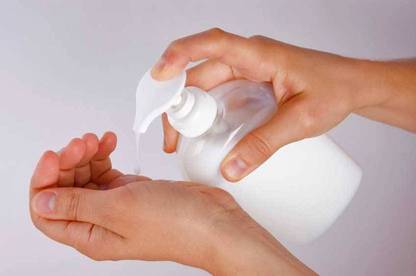
Antibacterial soaps
There’s no good evidence it works any better than regular soap.
If you believe the hype, antibacterial soap should be your first line of defence against the plague of disease-causing bugs lurking in every home.
Ads loudly trumpet the soaps’ “99.9%” bacteria-killing power, successfully playing on our fear of germs and boosting multi-million-dollar sales. But evidence these products provide any extra benefit is lacking. There’s also a chance they could do us harm.
Proof required

In 2013, the US Food and Drug Administration (FDA) announced proposed rule changes that will finally require manufacturers there to prove antibacterial soaps are safe for everyday use and more effective than plain soap and water in preventing the spread of infections.
The FDA’s announcement comes in the wake of research suggesting widespread use of antibacterial products may contribute to antibiotic resistance, a growing problem internationally. The agency believes there should be “a clearly demonstrated benefit” from using antibacterial soap to balance any potential risk.
We’ve been raising concerns about these products for more than a decade. At best, they’re little more than a marketing invention. At worst, there’s a risk they could reduce the effectiveness of drugs we rely on to fight infections when we do get sick.
Ingredients targeted
Triclosan and triclocarban are among the most common antibacterial agents manufacturers use in their products. Both are being targeted by the FDA’s rule changes.
We found triclosan listed as an ingredient in Health Basics Antibacterial Hand Wash and Select Anti-Bacterial Liquid Hand Wash. Triclocarban is used in Dettol Moisture Hygienic Soap, Protex Antibacterial Soap, and Palmolive Antibacterial Liquid Hand Wash.
Another Dettol product, Dettol Touch of Foam Hand Wash, contained benzalkonium chloride, which also features on the FDA’s hitlist.
These ingredients are currently approved for use in all soap and cosmetics sold here. They can also turn up in other products claiming germ-killing benefits.
But the growing use of antibacterial agents in consumer goods is contributing to concerns about their potential role in the development of antibiotic resistance.
Lab studies show bacteria exposed to antibacterial agents, such as triclosan, can become resistant to antibiotics. Whether this can also happen outside the lab isn’t yet known. Real-world studies have been limited and haven’t delivered definitive data for assessing the risk.
Both the FDA and scientific advisers in the EU have raised the need for more research. In a 2010 report on triclosan, the EU Scientific Committee on Consumer Safety stated the conclusions from lab studies can’t be ignored. The committee said it could only recommend the “prudent use” of the chemical where, for example, there was a clear health benefit.
Standard levels
The Cosmetic Products Group Standard permits the use of triclosan as a preservative in all cosmetics up to a concentration of 0.3 percent.
Triclocarban is permitted up to 1.5 percent in rinse-off products and up to 0.2 percent as a preservative in other cosmetics.
Benzalkonium chloride can be used up to 3 percent in rinse-off hair products and up to 0.1 percent in other cosmetics.
Since the standard was set, the EU Scientific Committee on Consumer Safety has released an updated opinion on the toxicity of triclosan that concluded its use in all cosmetic products isn’t safe because of the “magnitude of the aggregate exposure”. The committee recommended the ingredient not be allowed in body lotions or similar leave-on preparations. But changes to regulations have yet to be passed in the EU or here.
Environmental issues
Research to date has shown antibacterial agents are ending up in the environment. Triclosan has been found in water, sediments and soil in various parts of the world – raising the possibility that bacteria exposed to it could develop resistance, with flow-on effects for human health.
Triclosan has also been found in wastewater here. It’s one of the chemicals being tracked by researchers from the government-funded Centre for Integrated Biowaste Research. The research is part of a project investigating the environmental effects of ingredients used in common household products.
Project leader Dr Louis Tremblay, an environmental toxicologist at the Cawthron Institute, says the levels detected here are comparable to those reported in overseas studies. The results aren’t surprising, he says, given the chemical’s widespread use.
But despite the proliferation of products, there’s still little information about how they affect the environment. “Triclosan is constantly being released into the environment. The fundamental question is whether it’s increasing the resistance of bugs,” Dr Tremblay says.
The research, expected to be published soon, also suggests the concentrations of triclosan being found in wastewater at some sites could be toxic to certain marine organisms. Further work is planned to confirm the findings.
Dr Tremblay believes reducing the use of the chemical in household products would be the most effective way to minimise potential harm: “Triclosan is a very effective broad-spectrum antimicrobial but it should only be used where there’s a clear benefit. It’s overkill to use it in household soap.”
His advice for consumers: if you want to do something for the environment, choose a plain bar of soap.
Dr Jacqui Horswell agrees. Dr Horswell is an environmental microbiologist at Environmental Science and Research and also worked on the project led by Dr Tremblay. As she points out, “There’s good consumer choice in this market. You don’t have to buy antibacterial products.”
Unproven benefits
Still to emerge is reliable evidence that washing your hands with antibacterial soap provides any health advantage over using plain soap and water. Hand washing is important in reducing the spread of infections but the benefit doesn’t depend on the type of soap you use.
Studies cited by manufacturers to support claims for their products have been largely dismissed by the FDA. Of the best available studies the agency identified, none showed any clinical benefit for consumers from using antibacterial soap over regular soap and water.
One US study randomly assigned more than 200 households to use either antibacterial or regular products for 48 weeks. The authors found there was no significant difference in disease symptoms between households and no reduction in symptoms in households using antibacterial products.
Another study singled out by the FDA was based in squatter settlements in Pakistan. It also failed to show any clinical benefit from the use of antibacterial soap compared with plain soap. The study found that hand washing with either product was just as beneficial in reducing rates of common infections in these households.
Effective defence
Washing your hands with soap and water is one of the most effective defences against infections. If you don’t have access to running water, alcohol-based hand rubs are an alternative.
But the US Centers for Disease Control and Prevention (CDC) says the products need to contain at least 60 percent alcohol to be effective. The rubs won’t eliminate all germs and the CDC states they’re also less effective if your hands are visibly dirty or greasy.
Product changes
Controversy about the potential downsides of antibacterial soaps is finally forcing some manufacturers to act.

Health Basics, which uses triclosan in its antibacterial handwash, told us it was launching products this month (March 2014) that would not include the chemical. The company, owned by Australian Pharmaceutical Industries, has been keen to promote the “natural” ingredients in its products.
Reckitt Benckiser, which owns the Dettol brand, says it doesn’t use triclosan in its soaps or liquid hand washes, although it continues to use triclocarban and benzalkonium chloride. But it may have to review the use of these ingredients if the FDA’s rule change goes ahead. Reckitt Benckiser says it supports the FDA’s investigations and will “work with” the agency to verify the safety of its products.
Colgate-Palmolive, which uses triclocarban in its Palmolive and Protex antibacterial soaps, also told us its products “are safe and have clinically proven antibacterial efficacy”.
The Environmental Protection Authority, responsible for regulating cosmetic products here, says it has no plans to further restrict the use of antibacterial ingredients (see “Standard levels”, below). However, rule changes may happen as a result of future amendments to EU regulations on which our cosmetic standard is based.
In the meantime, manufacturers who make antibacterial claims that aren’t backed by good evidence will risk breaching the Fair Trading Act. A ban on unsubstantiated product claims, which takes effect from June, will give the Commerce Commission the power to prosecute companies if they don’t have evidence or reasonable grounds for product claims.
Our view
- Antibacterial soaps are a solution to a non-existent problem. Regular soap and water will get your hands as clean as they need to be. Don’t waste your money buying products claiming superior germ-killing power.
- There’s no evidence these products provide any extra health benefit. The widespread use of antibacterial products for essentially trivial uses could also end up doing us harm.
Product claims

Dettol Moisture Hygienic Soap
Claims:
“Helps to remove germs and contains added moisturiser that helps leave your skin feeling soft and smooth”
Contains: triclocarban
Dettol Touch of Foam Hand Wash
Claims:
“Kills 99.9% of germs … soft on skin, hard on germs, for healthy skin protected from germs and dryness”
Contains: benzalkonium chloride
Health Basics Antibacterial Hand Wash
Claims:
“Enriched with plant extracts, aloe vera, and the indigenous harakeke flax”
Contains: triclosan (product being reformulated)

Palmolive Antibacterial Defence Liquid Hand Wash
Claims:
“Kills germs and defends … specifically formulated to provide you with long-lasting antibacterial action”
Contains: triclocarban
Protex Antibacterial Soap
Claims:
“Eliminates 99% of bacteria … contains higher levels of antibacterial agent than most of Protex soaps and leaves you feeling confident and clean”
Contains: triclocarban
Select Anti-Bacterial Original Hygienic Liquid Hand Wash
Claims:
“Kills 99.9% germs”
Contains: triclosan

Antibiotic resistance
Antibiotic resistance is the ability of bacteria or other microbes to resist the effects of an antibiotic.
The Ministry of Health says some strains of antibiotic-resistant bacteria are already well-established here.
Monitoring data show the rate of MRSA (methicillin-resistant staphylococcus aureus) has doubled since 2003 with 1156 cases reported in 2012.
The development of resistant bugs is a “natural” phenomenon but its pace is being accelerated by the misuse of medicines. The prescription of antibiotics when they’re unnecessary – for example, for colds and flu – is regarded as a major cause of the problem. Colds and flu are caused by viruses, not bacteria, and antibiotics can’t do anything to treat them.
The use of antibiotics in agriculture and the widespread use of antibacterial agents in consumer products have also been identified as possible contributors to the problem.

We can't do this without you.
Consumer NZ is independent and not-for-profit. We depend on the generous support of our members and donors to keep us fighting for a better deal for all New Zealanders. Donate today to support our work.
Member comments
Get access to comment